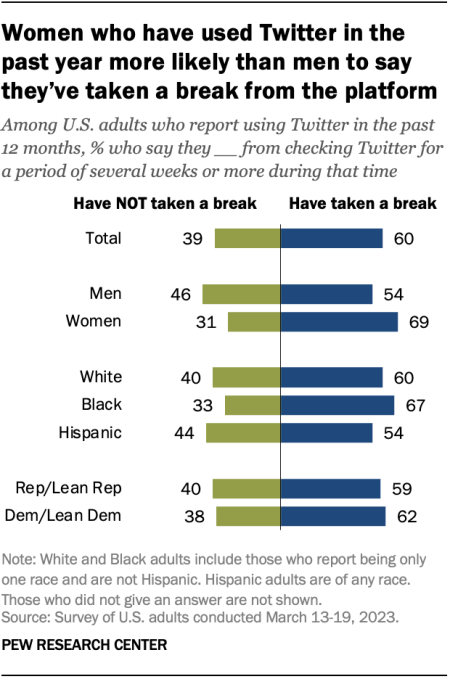A new study by Pew Research Center paints a picture of a pause in Twitter usage by U.S. adults, but the data doesn’t necessarily point the finger at Elon Musk’s takeover of the social media platform as the source of the blame. Instead, Pew’s survey of U.S. adults, which was conducted over a week in March, reports that a majority of U.S. adult Twitter users, or 60%, said they have taken a break from Twitter from using the service for “several weeks or more” over the past year.
However, Elon Musk officially acquired Twitter on October 27, 2022 — which means the company has only been in his possession for 6-plus months, not a full year. In other words, whatever led to Twitter users taking long breaks from the app may or may not have anything to do with the site’s new owner. And, because Pew Research didn’t offer any historical data to compare to, it’s not clear if this has been a regular pattern for Twitter users before this period, either.
Still, the data is interesting as it seemingly demonstrates that, for at least some of its users, Twitter has not built such an addictive platform that has become a required daily habit. Compared with Meta’s social apps, which now see 3.02 billion daily active users as of the first quarter, some Twitter users are avoiding the app for long stretches of time, if Pew’s data is to be believed. (Its methodology is here and involved over 10,000 respondents, if of interest.)
Pew’s further analysis may hint as to why that’s the case, noting that those who are more likely to have taken a break from the app include both women and Black users. Pew says 69% of women compared with 54% of men said they took a break from Twitter in the past 12 months. Meanwhile, 67% of Black users said they took a break from the app compared with 60% of white users and 54% of Hispanic users. (The survey data didn’t include enough Asian American Twitter users to offer a detailed analysis, the firm noted.)
This could suggest that it’s not politics or age — groups that saw no significant differences — that leads people to walk away from Twitter for a time. Rather it points to demographics that have historically faced the most harassment on the platform, according to prior analyses and reports, including those from Amnesty International.
But Pew Research fails to prove that any of this is specifically Musk’s fault, as the report looks at the past 12 months and not, for example, a comparison of usage from before Musk owned Twitter and after. If anything, this could suggest why Twitter, all along, has struggled to gain traction compared with its peers in social media — because it never got a full handle on the abuse taking place on the app, despite its ever-evolving policies meant to do just that.
In a separate study, also released today, Pew takes a glimpse into Twitter’s possible future by asking current and recent Twitter users how likely they are to use the platform a year from now.
More people (40%) said they were “extremely” or “very likely” to do so, while 35% said “somewhat.”
Yet, there was still a concerning quarter (25%) of Twitter’s current and recent users who said they were “not very likely” or “not at all likely” to be using the app in a year’s time.

Image Credits: Pew Research Center
Again, the demographics from the prior survey hold up here, as the current or recent Twitter users who are men said they were more likely than women to say they will “likely” use the platform a year from now — or 47% versus 31%.
Pew also found a partisan divide in terms of who sees themselves on Twitter in the future.
Current or recent users who are Republican or Republican-leaning are more likely than Democrats to say it’s “likely” they will use the site a year from now — or 45% versus 36%. Republicans were also more likely to say it’s “extremely likely” they’d still be on Twitter, compared with Democrats — or 25% versus 17%.
None of this necessarily points to a decline in Twitter active users, given that we don’t know how common it’s been for users to “take breaks” in the past. But other surveys from last year had suggested that was happening. For instance, one study covered by BuzzFeed News suggested the number of Twitter users in the U.S. had dropped 9% since Musk’s takeover. Another report from SimilarWeb (via Vox), said Twitter had higher traffic in the pre-Musk era than it did in January 2023. It noted visitor growth declined year over year from 4.7% in November 2022 to -2% in January 2023.
Musk countered these claims in November, saying Twitter usage was at an “all-time high.” And more recently, Apptopia’s data seemingly supported this statement, showing that Twitter’s daily active users grew from 229 million in Q1 2022 to 246.8 million, on average, since October 2022, Digiday said in April, with a mean average increase of 1.3 million new users each month. (This finding didn’t break things down by country, but the U.S. is Twitter’s largest market).
If anything, then, what Pew’s data indicates is not to what extent Musk’s policies and general chaos-making at Twitter have hurt the app’s usage in the U.S., but how far the company has to go to be the sort of app that users don’t need to regularly put on pause.
Pew: 60% of U.S. Twitter users have ‘taken a break’ from the platform in the past year by Sarah Perez originally published on TechCrunch
from TechCrunch https://ift.tt/a9i8Dpt


0 Comments